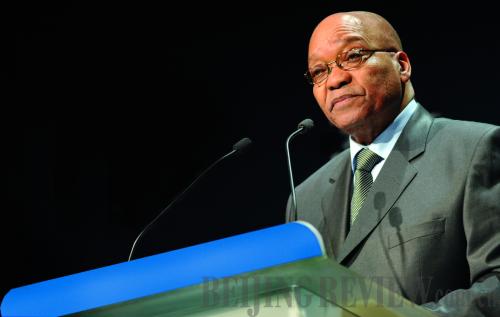|
 |
|
CLEAR FOCUS: South African President Jacob Zuma on a mission to boost trade ties with China (COURTESY PHOTO) |
In reviewing the China-Africa relationship in 2010, two major issues deserve close attention. One is South African President Jacob Zuma's visit to China this past summer. The second is Sino-African trade that is expected to reach or even surpass the 2008's record high of $106.8 billion.
One of the strategic objectives of Zuma's visit was to expand and strengthen South Africa's economic and trade relationship with China. A number of cabinet ministers and more than 350 business executives and entrepreneurs accompanied the president on his trip, making it the largest ever South African delegation visiting a foreign country. During the meeting with Chinese President Hu Jintao, the two heads of state signed the Beijing Declaration, in which the bilateral relationship was elevated from "strategic partnership" to "comprehensive strategic partnership," ushering in a new era of alliance.
As Africa's largest economy, South Africa has been maintaining sound momentum in its economic growth. From 2004 to 2007, the country's GDP growth rate increased from 4.9 percent to 5.3 percent. But in 2009, the economy was badly hit by the financial crisis. Mired in low domestic demand, falling exports and high unemployment rate, South Africa entered its first slowdown in 17 years, with its economy down by 1.8 percent.
Yet while bilateral trade with EU and other traditional trading partners slumped, its trade with China and other emerging economies remained sound. Last year, China became South Africa's largest trading partner, with bilateral trade reaching $16.06 billion, and totaling $10.8 billion in the first half of 2010, up 56 percent year on year. Meanwhile, China has become a major investor in the country's key areas, like mining and financial services.
Prior to the visit, South African magazine Financial Post commented that the government was taking a policy of "looking east for growth," with Chinese investment booming and the world's economic core gradually moving toward developing countries.
During Zuma's China trip, South Africa's Standard Bank signed a memorandum of understanding on cooperation with the China Railway Group on rail projects. In the future, the two countries will collaborate in more areas like infrastructure construction, mineral processing, engineering, energy, information, communication technology and electronics sector.
The other objective of the visit was to strengthen political and strategic ties with China in order to join "BRIC" (an acronym for Brazil, Russia, India and China, four countries that are at a similar stage of economic development). Zuma had already visited the other three, seeking support. "It is an irrefutable fact that economic power is in a process of shifting from North to South, and West to East," said Zuma during his China stay. Joining the BRIC club would help fuel the economic development and poverty alleviation in both South Africa and other parts of Africa, he said. According to South African media analysis, closer cooperation with the "Big Four" was an inevitable result of BRIC's increasing influence on the African continent, and would benefit the country's development in the post-financial crisis era.
Zuma's visit and the establishment of a China-South Africa comprehensive strategic partnership will play a leading role in promoting a new rapport between China and the whole of Africa. Although South Africa is Africa's economic and political giant, challenges exist for its relationship with China, such as trade imbalances and an outdated trade structure. These have implications for China when communicating with other African countries.
Since South Africa is the largest foreign investor in many African countries, a close China-South Africa relationship will help improve the external investment environment on the continent and promote post-crisis recovery and growth. Strengthening relations with South Africa doesn't mean other African countries will be weakened. Just as the take-off of Asia's "Four Little Tigers" played a major role in the world economy in the 1970s and 1980s, the strong economic links China has with South Africa and other African economic powers will boost expansion of Sino-African relations overall.
Improved China-South Africa trade relations contributed greatly to the $106.8 billion trade between China and Africa in 2010. But the number is also thanks to the following factors.
Western countries' shrinking investment and assistance to Africa offered new opportunities for China-Africa trade. Mired in the financial crisis and the subsequent sovereign debt crisis, Africa's traditional investors and donors, Europe and the United States, had to cut down their market size on the continent. This provided China and other emerging economies with the chance for a new round of South-South cooperation.
The rising prices of raw materials and other commodities in Africa combined with China's continued prosperity promoted a quick rebound on the continent. In 2009 when prices plummeted during the global economic crisis, the growth rate across Africa fell below 2 percent and per-capita GDP grew negatively for the first time since 1994. Sustained high economic growth in China and other Asian countries raised the commodity prices again, and African countries that rely heavily on bulk export of raw materials resumed exporting. Africa's overall economy is expected to rebound in 2010, increasing by more than 4 percent.
New policies at the Forum on China-Africa Cooperation (FOCAC) also helped trade volume. At FOCAC's Fourth Ministerial Conference held in Sharm el-Sheikh, Egypt in November 2009, "eight new measures" were launched. Apart from continuing and increasing support in various areas like debt relief, expanding investment and aid to Africa, the new policies also put forward new measures on environmental protection, clean energy, science and technology cooperation and more support for African small- and medium-sized enterprises. These policies are conducive to expanding Chinese and African market capacity and updating trade structures, and the projects signal a new period of development for China-Africa trade and relations.
(The author is a researcher at the Institute of Western Asian and African Studies at the Chinese Academy of Social Sciences) |